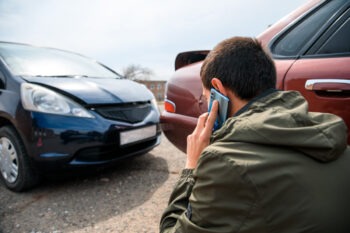
After a car accident in Florida, understanding fault can be complicated. The confusion and uncertainty that follow a collision can leave you questioning your next moves. It’s in these moments of uncertainty that knowledge becomes your greatest ally.
While this short guide aims to provide answers to some of the most common questions, it is important to understand that every accident is different, and only your car accident attorney can answer specific questions about your case. They can also guide you through the legal system, ensuring your rights are protected, and you’re on the road to rightful compensation.
What to Do Immediately After a Car Accident?
In the aftermath of a car accident, clarity may feel elusive, leaving you uncertain about your next steps toward recovery and securing your rights. But these critical moments can significantly impact your journey.
Your Well-Being is Priority One
Ensure you’re safe and move to a secure location, away from potential hazards. Call 911 to seek immediate medical attention, regardless of the perceived severity of your injuries. Prompt medical care can impact your recovery and strengthen your claim.
Gathering Crucial Details
Exchange important information with the involved parties, including names, contact numbers, addresses, license plate details, and insurance information. If possible, gather statements and contact details from any witnesses at the scene. Document the accident and injuries through photographs, as visual evidence can be invaluable.
Seeking Professional Guidance
Contact an experienced personal injury attorney promptly. Seeking guidance from a trusted professional can help you navigate this unfamiliar terrain, ensuring you come back stronger on the other side.
Who Determines Fault, and How, After a Car Accident in Florida?
When the dust settles after a car accident, a pivotal question arises: Who is at fault? Determining fault is a critical aspect of the legal process in Florida, but it doesn’t have to be a complex riddle. Let’s unravel this puzzle and simplify the steps.
Law Enforcement
After an accident, the police are often the first to arrive at the scene. They gather evidence, talk to witnesses, and create an official report detailing their findings, including their assessment of fault.
Insurance Companies
Insurance adjusters play a significant role. They review the police report, statements from involved parties, and any additional evidence to determine liability from an insurance standpoint.
Legal System
In case of legal disputes or if parties involved cannot agree on fault or compensation, the matter may escalate to the legal system. A Florida Court will then decide fault based on presented evidence and arguments.
What Evidence Helps Determine Fault?
The fault is determined based on a preponderance of evidence. That means the side with the most convincing evidence supporting their version of events is likely to win the case. Evidence may include:
- Statements and testimonies: Eyewitness accounts and statements from involved parties.
- Traffic laws and violations: Adherence or violation of traffic rules and regulations.
- Photographs and videos: Visual evidence of the accident scene, damages, and road conditions.
- Accident reconstruction: Analysis and recreation of the accident to determine how it occurred.
How to Calculate Damages After a Florida Car Accident?
Worries about medical expenses, vehicle repairs, lost wages, and other costs can add stress to an already overwhelming situation. Let’s shed some light on how you can calculate and navigate these damages.
Assessing Economic Damages: the Tangible Costs
- Medical expenses. Account for all medical costs, including hospital bills, doctor’s visits, medication, surgeries, rehabilitation, and any future medical treatments related to the accident.
- Property damage. Calculate the expenses for repairing or replacing your vehicle and any other damaged property resulting from the accident.
- Lost wages. Consider the income you’ve lost due to the inability to work during your recovery. That should include any sick leave or vacation days used during this period.
Accounting for Non-Economic Damages: the Intangible Costs
- Pain and Suffering. Quantify the physical and emotional pain experienced due to the accident, considering the impact on your daily life and well-being.
- Mental Anguish. Consider the psychological distress, anxiety, and emotional suffering resulting from the accident and its aftermath.
If you still have questions about how much your case is worth, contact a car accident attorney.
What Is the Statute of Limitations for a Car Accident in Florida?
The statute of limitations for filing a personal injury lawsuit after a car accident in Florida is two years from the date of the accident. That means you have a two-year window to initiate legal proceedings from the date of the incident.
It’s important to note that if you fail to file a lawsuit within these two years, you may lose your right to seek compensation through the legal system. Exceptions to this timeframe are rare and typically involve specific circumstances, such as discovering injuries or damages after the accident.
Can I Talk to a Car Accident Lawyer Today?
If you’ve been involved in a car accident, the journey towards recovery and rightful compensation can seem like an uphill battle. At Fasig | Brooks, we’re here to be your dedicated advocates on this challenging road. Our experienced car accident lawyers understand the intricacies of the legal system and are committed to helping you navigate through the complexities.
Our experienced attorneys will provide you with support, guidance, and peace of mind during this trying time. Contact our car accident lawyers today for a free consultation. Let’s discuss your case, understand your needs, and outline a strategic approach toward securing the compensation and justice you deserve.



